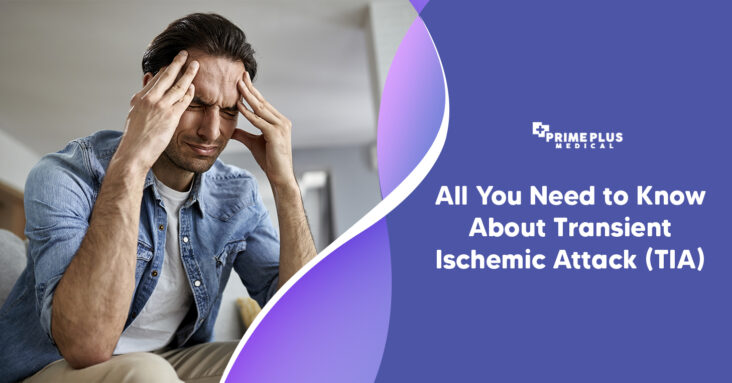A transient ischemic attack, often referred to as TIA or a mini-stroke, is a stroke that lasts only a few minutes. A transient ischemic attack is caused by a temporary disruption in the blood supply to part of the brain.
The transient ischemic attack is a medical condition that demands attention as it may be a warning sign for more severe cerebrovascular events or strokes.
Being well-informed about the basics of transient ischemic attack and recognizing its signs can help prevent strokes. Therefore, this article aims to share the must-knows about the transient ischemic attack, including the most common signs, symptoms, causes, and available treatments.
What is a transient ischemic attack (TIA)?
Transient means temporary, and ischemia is the medical term for an inadequate blood supply. And as mentioned earlier, a transient ischemic attack is a temporary disruption of blood flow to the brain.
This attack results in symptoms similar to those of a stroke. However, unlike a stroke, the blood flow blockage in a transient ischemic attack is temporary and does not cause permanent brain damage.
According to the American Stroke Association, the clot causing a TIA usually dissolves on its own or gets dislodged. The symptoms normally last for less than five minutes.
What are the common signs and symptoms of a transient ischemic attack?
Sudden weakness or numbness
One of the most common symptoms of a TIA is the sudden onset of weakness, numbness, or paralysis, which typically occurs on one side of the body. These symptoms can affect the face, arm, or leg.
Difficulty speaking
Some individuals with TIA experience difficulty speaking, slurred speech, and confusion understanding others.
Vision problems
During a TIA, a person may experience blurred vision, double vision, or temporary blindness in one eye. According to the American Stroke Association, some individuals who suffer from TIA also experience temporary blindness in both eyes.
Dizziness and loss of balance
TIA may cause sudden dizziness or loss of balance, which can result in a fall.
Severe headache
A sudden and severe headache with no apparent cause, often described as the “worst headache of my life,” can be a symptom of a TIA, although this is less common.
read more article: Identify Early Signs of Heart Attack
What causes a transient ischemic attack?
The primary cause of a transient ischemic attack is the temporary interruption of blood flow to the brain caused by a blockage in one of the blood vessels supplying the brain with blood. The blockage is usually a blood clot. However, according to the National Health Service (UK), the blockage that causes TIA can also be caused by pieces of fatty material or air bubbles.
Aside from blood clots, other causes of TIA include:
Heart conditions
Abnormal heart rhythms, such as atrial fibrillation, can lead to the formation of blood clots that may travel to the brain.
Narrowed blood vessels
Narrowing blood vessels in the neck due to atherosclerosis can decrease blood flow to the brain.
High blood pressure
Uncontrolled high blood pressure is known as a significant risk factor for TIAs.
And How to treatment?
Emergency medical attention
If you or someone experiences symptoms of a TIA, seek immediate medical attention. Even though the symptoms may resolve without treatment, it is crucial to determine the underlying cause and take preventive measures.
Medications
Depending on the cause of the TIA, your doctor may prescribe medications to reduce the risk of blood clots, lower blood pressure, or manage underlying health conditions.
Lifestyle changes
Changes in your lifestyle can play a vital role in preventing future TIAs and strokes. These healthy adjustments include adopting a heart-healthy diet, quitting smoking, maintaining a healthy weight, and regular exercise.
Surgery
In some cases, endarterectomy, a surgical procedure to remove plaque from the lining of an artery, may be necessary to remove blockages or repair abnormal blood vessels.
Transient ischemic attacks often serve as warning signs of impending strokes. Thus, recognizing the signs and symptoms of TIA and seeking prompt medical attention can significantly reduce the risk of strokes.
If you or someone you know experiences symptoms of a TIA, remember that time is of the essence, and seeking immediate medical help is crucial. Our English-speaking team of doctors at Prime Plus Medical in Canggu is ready to assist you 24/7.

